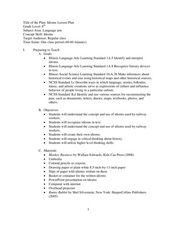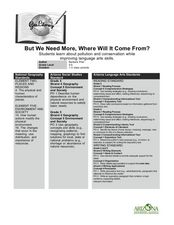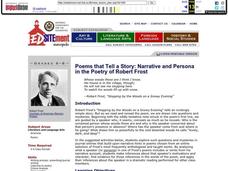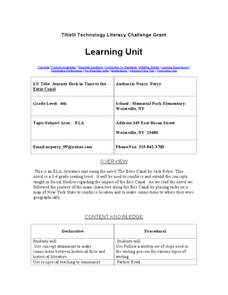Curated OER
Which Colored Filter Will Decode a Secret Message?
Students investigate how to create secrete messages through filters. They view pictures with red and green filters and discuss what they observe. They select the color filter that works best to read secret messages. They view pictures...
Curated OER
Are You Thirsty? The Effects of Pollution on Drinking Water
Discuss the availability of clean, plentiful water and the causes of water pollution. In groups, sixth graders discuss problem-solving methods for keeping water clean. They explore the function of water treatment plants and perform...
Curated OER
Idioms Lesson Plan
Sixth graders discover idioms. In this idioms instructional activity, 6th graders evaluate idioms and discover their meaning. Students read Runny Babbit by Shel Silverstein and create unique idioms. Assessment rubric is provided.
Curated OER
Weather Observation Journal
Students research weather patterns. For this weather lesson, students read Chester Noongwook's Rules of Weather Observation and keep a weather journal for one month. Students observe the weather patterns throughout the month.
Albert Shanker Institute
Economic Causes of the March on Washington
Money can't buy happiness, but it can put food on the table and pay the bills. The first of a five-lesson unit teaches pupils about the unemployment rate in 1963 and its relationship with the March on Washington. They learn how to create...
Curated OER
Cattle Drive
Students explore cattle drives. In this United States history and letter writing lesson, students write a letter to their family predicting possible problems that were encountered by participants in cattle drives. Students design brands,...
Curated OER
But We Need More, Where Will It Come From?
Students write a persuasive letter and create a poster about pollution and conservation. In this pollution and conservation lesson plan, students learn how humans are the number 1 cause of pollution.
Curated OER
the Declaration of Independence Lesson
Young scholars demonstrate reading comprehension skills, including reading strategies, inference, literal meaning, and critical analysis.
Curated OER
COMING TO AMERICA:A PILGRIM STORY LESSON
By completing this lesson, students demonstrate their reading comprehension skills, including reading strategies, inference, literal meaning, and critical analysis.
Curated OER
Civil War: The North History Lesson
Young scholars demonstrate their reading comprehension skills, including reading strategies, inference, literal meaning, and critical analysis.
Curated OER
Literature-based Skill Building: Holes by Louis Sachar (Chapter 39)
For this literature response worksheet, students answer 20 short essay questions about Chapters 39-44 of the book Holes by Louis Sachar.
Curated OER
Monitoring Comprehension Progress: Story Retells
Students retell a story by filling out a record sheet. In this retelling lesson plan, students fill out a record sheet that gives them prompts about the beginning, middle, and end of a story.
Curated OER
Poems that Tell a Story: Narrative and Persona in the Poetry of Robert Frost
Pupils read and discuss poems by Robert Frost. Students collaborate in small groups to draw inferences about speakers' character and motives and to gather evidence supporting those inferences.
Curated OER
Looking Back to 1980
Students use clustering/mind mapping techniques to generate ideas, graphically represent inferences, organize their conclusions and write a report that presents conclusions the writer has reached, and facts substantiating those conclusions.
Curated OER
Collaborative Book Club Groups
Students participate in book club forums where they write descriptive, evaluation, analysis, synthesis, or inference essays. They take on the role of a character in their bok and publish a web page.
Curated OER
Finding Buck Henry
Students read and demonstrate competence in the general skills and strategies of the writing process via the novel "Finding Buck Henry." They recognize complex elements of plot. Students analyze devices used to develop characters in...
Curated OER
Japanese Objects as Cultural Artifacts: A Model Lesson Using Textiles
Pupils complete a unit on the cultural significance of textiles in the Japanese culturre. They analyze cotton, line, silk, and wool fabrics, examine various fabric creation and decoration techniques, select an object and write a detailed...
Curated OER
Gray Whales: Hitchhikers: Free Rides on Gray Whales
Students read about Gray Whales and circle any unfamiliar terms.
Curated OER
Meet the Eastern Flock: Hatch Year 2002
Students read nonfiction books and magazine articles about whooping cranes.
Curated OER
What You See Is What You Get
Students practice visualization as a strategy for reading and comprehending math word problems.
Curated OER
Erie Canal: Journey Back in Time
Fourth graders read the novel, The Eric Canal, identifying the characters and setting. They respond to daily reading by writing in journals and complete a short answer test upon completion of the novel.
Curated OER
Kissing Coyotes
Fourth graders are read the book "Kissing Coyotes". During the story, they make predictions about what they believe might happen next. After the story, they create their own story using their imagination and draw illustrations.
Curated OER
Narrative Strategies
Sixth graders explore strategies authors use to make characters and setting seem real to readers. They develop characters and describe setting in original narratives. Students read myths and determine common themes found in myths from...
Curated OER
"Rikki-Tikki-Tavi"
Students explore nature by reading stories in class. In this animal characteristics lesson, students read the story "Rikki-Tikki-Tavi," by Rudyard Kipling and identify the different animals mentioned in the book. Students review the...
Other popular searches
- Making Inferences in Reading
- Making Inferences Reading
- Inferences in Reading
- Reading Inferences 4th Grade
- Reading Inferences 6th Grade
- Reading Inferences Poetry
- 1st Grade Reading Inferences
- Draw Inferences in Reading
- Reading Inferences Handouts
- Guided Reading Inferences
- Shared Reading Inferences
- Make Inferences Reading























